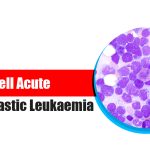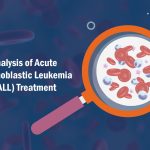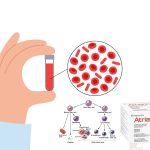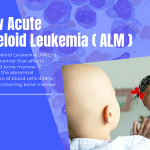Leukemia is a type of cancer that develops in the bone marrow, where blood cells are made. Under normal circumstances, the bone marrow produces immature blood cells, called blast cells, which mature into red cells, white cells, and platelets. However, in leukemia, these cells undergo malignant changes. Instead of maturing properly, they start growing uncontrollably, disrupting the production of normal blood cells. Leukemia mainly affects developing white cells, though in rare cases, it can also affect other blood-forming cells like platelets or red cells.
Types of Leukemia:
There are four major types of leukemia:
- Acute myeloid leukemia (AML)
- Acute lymphoblastic leukemia (ALL)
- Chronic myeloid leukemia (CML)
- Chronic lymphocytic leukemia (CLL)
Leukemia can develop in adults and children, but some types are more common in specific age groups.
What is T-Cell Acute Lymphoblastic Leukemia?
T-cell acute lymphoblastic leukemia (T-ALL), also known as precursor T-lymphoblastic leukemia, is a form of lymphoid leukemia that involves an overproduction of immature white blood cells (T-cell lymphoblasts). These cells are typically found in the bone marrow, blood, and tissues like mediastinal lymph nodes.
T-ALL is relatively rare in adults, but it accounts for approximately 15% of childhood acute lymphoblastic leukemia cases and nearly 90% of lymphoblastic lymphoma cases.
Symptoms of T-ALL:
A diagnosis of ALL is usually confirmed through blood and bone marrow tests, which evaluate blood cell counts, blood chemistry, and bone marrow samples. Common symptoms of ALL include:
- Weight loss
- Fever
- Night sweats
- Fatigue
- Loss of appetite
These symptoms are often non-specific and may overlap with other conditions, making diagnosis more challenging.
Causes of T-ALL:
T-cell acute lymphoblastic leukemia is mainly caused by errors in the DNA of bone marrow cells. These errors trigger abnormal cell growth and division, preventing the cells from maturing and dying at the proper time. As a result, abnormal blood cells accumulate and interfere with normal blood cell production.
Diagnosis of T-ALL:
To diagnose T-ALL, your healthcare provider will ask about your symptoms and medical history, and they will perform a physical exam to check for signs such as swollen lymph nodes, bruising, or infections. Diagnostic tests for leukemia may include:
- Blood tests: A complete blood count (CBC) to check the number and appearance of different types of blood cells.
- Bone marrow test: A bone marrow sample, usually taken from the chest or hip, to check for signs of leukemia.
- Imaging tests: X-rays, CT scans, or ultrasounds to determine if the cancer has spread.
- Spinal tap (lumbar puncture): A sample of the fluid surrounding the spinal cord to check if the cancer has spread to the brain or spinal cord.
Treatment Options for T-ALL:
T-cell acute lymphoblastic leukemia (T-ALL) is aggressive but curable with proper treatment. The treatment for T-ALL often includes a prolonged schedule of chemotherapy over several months. This begins with an intensive chemotherapy phase lasting 4 to 8 months, followed by oral chemotherapy that may last 1.5 to 2 years or longer.
Treatment aims to induce a lasting remission, defined as the absence of detectable cancer cells in the body. In recent decades, significant progress has been made in increasing the effectiveness of treatment, leading to higher survival rates. Treatment options may include:
- Chemotherapy: A combination of drugs to kill cancer cells.
- Radiation therapy: High-energy rays to target and kill cancer cells.
- Stem cell or bone marrow transplant: Replacing damaged bone marrow with healthy stem cells.
- Targeted therapies: Drugs designed to attack specific cancer cells.
Advances in T-ALL Treatment: Atriance in India
Atriance (Nelarabine) is a newer drug that has been developed to treat T-cell ALL. It is approved for patients whose disease has relapsed or not responded to at least two chemotherapy regimens. Atriance is given intravenously, which means it is administered through a vein.
Atriance is now available in India, and the Indian Pharma Network (IPN) can facilitate the export of this therapeutic drug to countries around the world, including Brazil, UAE, Saudi Arabia, Bangladesh, Japan, North Korea, Iran, Sudan, Syria, Libya, Sri Lanka, South Africa, and Vietnam, where patients need access to this life-saving medication.
FAQs:
What is the main cause of T-ALL?
T-cell acute lymphoblastic leukemia occurs when a bone marrow cell develops DNA mutations that cause it to grow uncontrollably instead of maturing and dying normally. These abnormal cells interfere with normal blood cell production.
How is T-ALL diagnosed?
Diagnosis typically involves blood tests, bone marrow tests, imaging tests (such as CT scans or X-rays), and sometimes a spinal tap to check if the cancer has spread to the brain or spinal cord.
Is T-ALL curable?
Yes, T-ALL is curable, especially with proper treatment. Treatment typically includes an intensive chemotherapy regimen followed by long-term oral chemotherapy to maintain remission.
What is Atriance, and how does it help treat T-ALL?
Atriance (Nelarabine) is a drug used to treat T-ALL in patients who haven’t responded to previous treatments. It is an intravenous medication that targets and destroys cancerous cells in the blood and bone marrow.
Can Atriance be exported from India?
Yes, Atriance is now approved in India, and the Indian Pharma Network (IPN) can facilitate its export to different countries worldwide. Send your inquiries to buy Atriance in Brazil, UAE, Saudi Arabia, Somalia, Turkmenistan, Venezuela, Cuba, Zimbabwe, Myanmar, Belarus, Bangladesh, Japan, North Korea, Iran, Sudan, Syria, Libya, Sri Lanka, South Africa, and Vietnam, where it may be needed for patients with T-ALL.
Conclusion:
T-cell acute lymphoblastic leukemia (T-ALL) is a serious but treatable condition. With advancements in treatment, including drugs like Atriance, the prognosis for patients with T-ALL has improved significantly. If you or a loved one is in need of treatment for T-ALL, the Indian Pharma Network (IPN) is here to help with the export of Atriance to various countries across the globe. Contact IPN today via Call/WhatsApp: +919310090915 or TOLL-FREE: 1800-889-1064.






